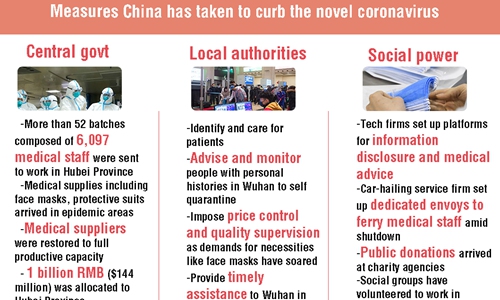HOME >> SOURCE
Virus won’t give the US more leverage in phase two talks
Source:Global Times Published: 2020/2/2 22:39:22

Infographic: Globaltimes.cn
As China wages a nationwide battle against the outbreak of the novel coronavirus (2019-nCoV) that has killed more than 300 people and infected over 14,000 more and the world scrambles to cope with another potentially heavy blow to the world economy, some in the US appear to be calculating that the epidemic, which is expected to further drive down growth in China, would give the US extra leverage in negotiations for a phase two trade agreement.
Needless to say, such moves are wrong on so many levels, including on a moral level. Also important is that if US officials are counting on the epidemic to gain more leverage for the phase two trade negotiations, they are gravely mistaken.
The coronavirus outbreak will pose a serious challenge for the Chinese economy, with some predicting the epidemic will slash growth in the first quarter by two percentage points. But China will not and cannot give ground on core issues of national interests in the trade talks, particularly at such a difficult time. Also important to note is that China is now even more unlikely to rush into phase two talks as it has diverted its full focus onto containing the outbreak and its impact on the domestic economy.
During a recent interview, an anchor for the Fox Business Network asked White House economic adviser Larry Kudlow if the virus will give the US more leverage in the phase two negotiations. While Kudlow said that the outbreak is "completely separate from trade, jobs and all the rest," it was telling that some in the US are calculating such a scenario.
Last week, US Commerce Secretary Wilbur Ross made a shocking statement, suggesting that the epidemic in China could "help to accelerate" the return of jobs to the US and predicating that businesses could shift their supply chain out of China due to the virus.
US officials have long been very anxious to launch negotiations for a phase two trade agreement, as US President Donald Trump faces a heated general election and continues to be engulfed in constant domestic political battles. Even before the phase one deal was inked, Washington said phase two talks would start immediately and have even indicated that tariffs could be reserved for a phase two deal.
Chinese officials have been reluctant to rush into talks for a phase two deal and have instead stressed the implementation of the phase one agreement. With their full attention now on stopping the virus outbreak, they are unlikely to commit to trade negotiations anytime soon, let alone giving ground on core issues.
However, the coronavirus outbreak, despite its deadly nature and negative impact, poses a rare opportunity for China and the US to cooperate to ease their tensions, which is also the goal of the trade talks. For instance, China has a huge demand for healthcare products and services in the fight against the epidemic, which the US could supply. China's increasing import of US products, including medical instruments, is already part of the phase one deal.
Instead of calculating how to gain more leverage in the elusive phase two negotiations, the US should work with China to fight the virus that poses risks for not just the Chinese economy but also the global economy. That is conducive to carrying out the phase one deal and paving the way for phase two talks, which US officials so crave.
Posted in: GT VOICE